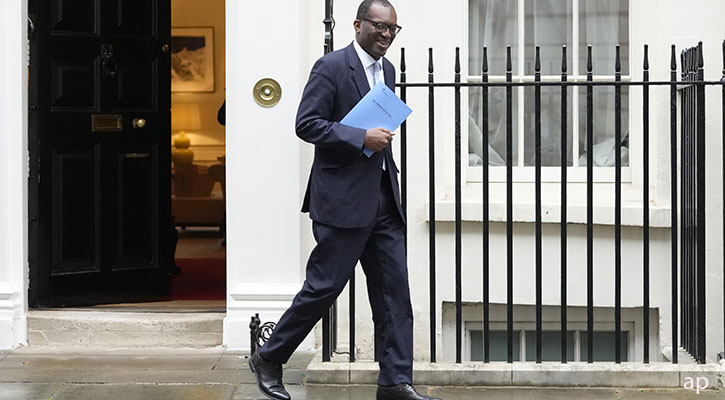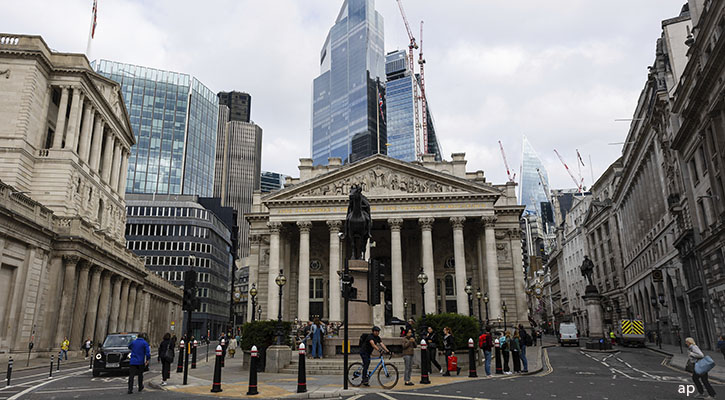.png)
We reviewed how a range of our highly rated fixed-income strategies adjusted their portfolio positioning in UK bonds in light of the recent market volatility, while also discussing with managers if the current repricing has resulted in any compelling opportunities in UK assets.
Within the global flexible-bond Morningstar Category, M&G Global Macro Bond, which has a Morningstar Analyst Rating of Silver, entered the period of market turmoil with low exposure to UK assets and a duration of around 0.3 years, mainly from sterling corporates. Jim Leaviss took advantage of the sell-off and added around 0.5 years of duration by buying gilts.
A notable example were gilts maturing in 2051 at a yield of 5.5%. Gold-rated Jupiter Strategic Bond has currently limited UK exposure, mainly high yield corporates with a maturity below five years, accounting in total for 0.6 years of duration. Although valuations have reached attractive levels according to manager Ariel Bezalel, no exposure has been added to either gilts or corporate credit owing to his concerns over the credibility of the government's policy decisions. Duration exposure mainly stems from the United States, Australia, and South Korea, which provide cleaner macro stories, more orderly markets, and greater policymaking credibility, according to Bezalel.
Bronze-rated JPMorgan Global Bond Opportunities had implemented a short gilt position (negative 0.2 years) prior to the announcement of the min-budget given increased expectations about the wave of issuance that will be required to fund fiscal policy. The strategy also had around 4% exposure in UK investment-grade credit throughout the eventful period. Overall, the team is finding better opportunities outside the United Kingdom, given current concerns over the UK's institutional credibility, the likely further upward inflation pressure from the planned fiscal boost, and the Bank of England's quantitative tightening program, which will lead to higher gilt supply for most of the fourth quarter, putting further upward pressure on yields.
Silver-rated Invesco Corporate Bond UK, which is part of the GBP corporate bond category, and Silver-rated Invesco Sterling Bond, which is in the GBP diversified bond category, have not materially adjusted portfolio positioning after the recent events. As yields have risen, the managers here have been gradually adding to duration by increasing exposure to investment-grade and subordinated financials, as well as corporate hybrids. They have not been adding much to high yield, though, given their view that there is now more yield available in high-quality credit than there has been for some time.
Bronze-rated Royal London Corporate Bond (GBP corporate bond category) entered the year with a short duration position but over time moved to a neutral position following the recent strong upward move in yields. Turnover in the portfolio over recent weeks has been low, which mainly reflects the very low level of sterling credit new issuance.
However, the managers believe that the market has presented some opportunities to benefit from spread-widening and have added to financials. The portfolio maintains its underweight in the cyclical consumer and industrial areas.
Where Do We Go From Here?
It's worth noting that as of October 4, bond yields were broadly back where they were just before the mini-Budget. The same goes for the sterling versus the dollar. Overall, managers have not adjusted their UK positioning in material fashion. Some slightly increased their UK duration and tried to take advantage of more attractive valuations in gilts and corporate bonds as a result of the recent selloff.
However, although managers largely agreed that the selloff created some attractive entry points, the overall uncertainty and conflicting signals between a central bank that is fighting inflation and a government that is trying to support growth by creating additional inflationary pressures are likely to lead to elevated volatility, and this has curtailed conviction in UK assets.
At the same time, diversified managers seem to believe that other regions offer a more stable investment framework at this juncture. In any case, the recent volatility in the UK bond yields and sterling emphasised the importance of a flexible and nimble investment process, which allows a manager to cut risk when markets become volatile, while also having the ability to deploy capital after a dramatic market sell-off.





























